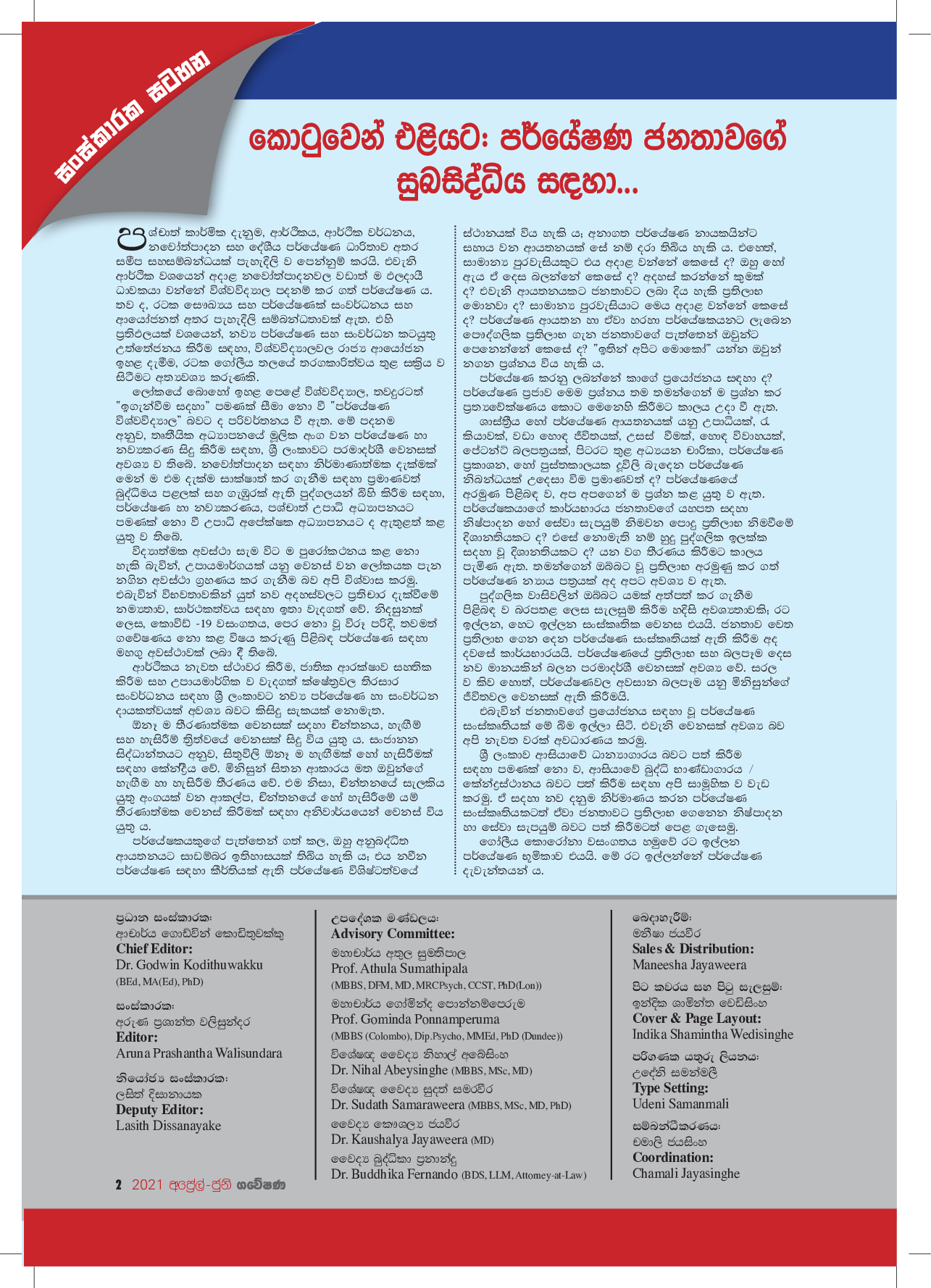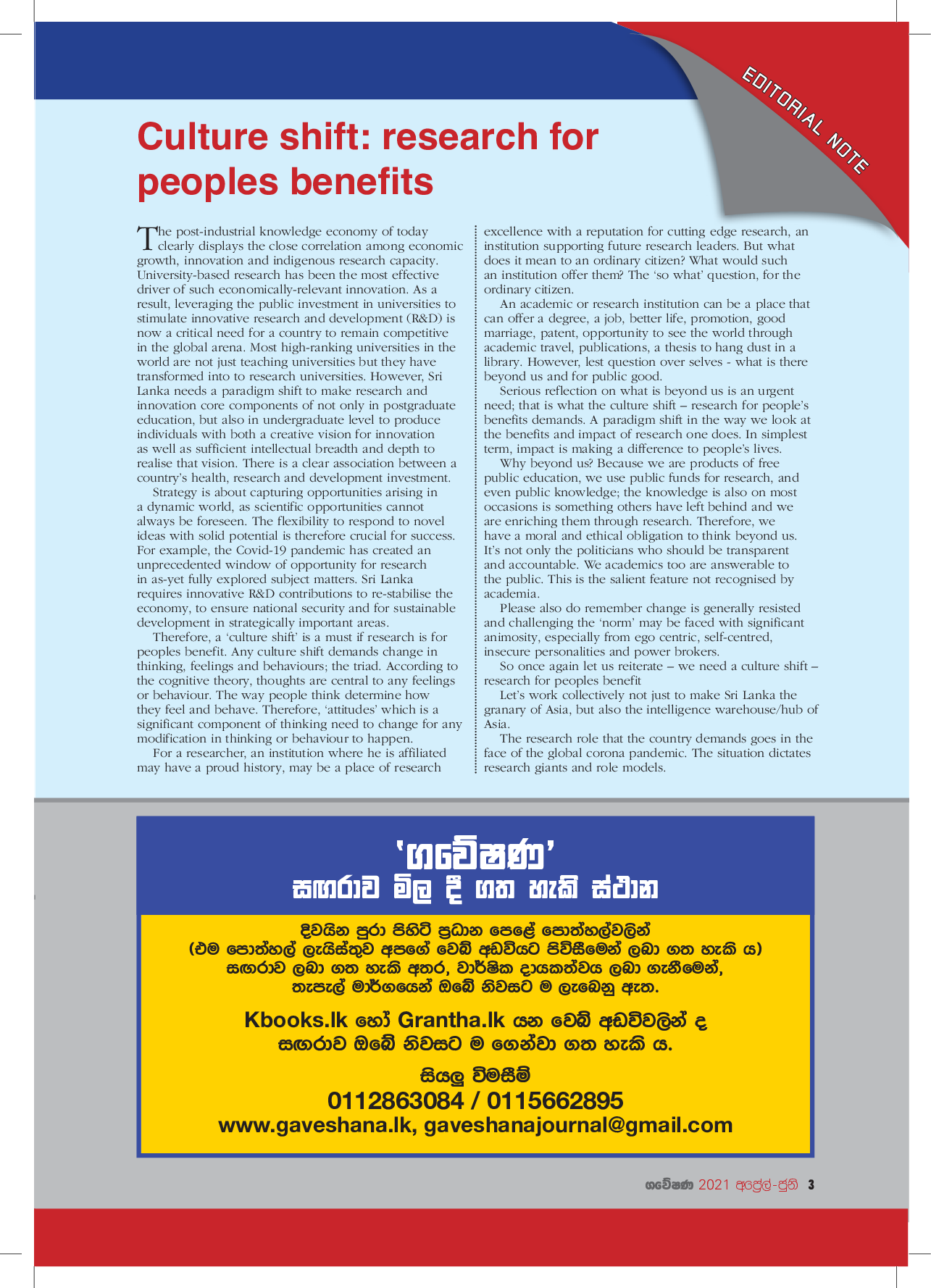කොටුවෙන් එළියට පර්යේෂණ ජනතාවගේ සුබසිද්ධිය සඳහා…
පශ්චාත් කාර්මික දැනුම, ආර්ථීකය, ආර්ථීක වර්ධනය, නවෝත්පාදන සහ දේශීය පර්යේෂණ ධාරිතාව අතර සමීප සහසම්බන්ධයක් පැහැදිලි ව පෙන්නුම් කරයි. එවැනි ආර්ථීක වශයෙන් අදාළ නවෝත්පාදනවල වඩාත් ම ඵලදායී ධාවකයා වන්නේ විශ්වවිද්යාල පදනම් කර ගත් පර්යේෂණ ය. තව ද, රටක සෞඛ්යය සහ පර්යේෂණක් සංවර්ධනය සහ ආයෝජනත් අතර පැහැදිලි සම්බන්ධතාවක් ඇත. එහි ප්රතිඵලයක් වශයෙන්, නව්ය පර්යේෂණ සහ සංවර්ධන කටයුතු උත්තේජනය කිරීම සඳහා, විශ්වවිද්යාලවල රාජ්ය ආයෝජන ඉහළ දැමීම, රටක ගෝලීය තලයේ තරගකාරිත්වය තුළ සක්රිය ව සිටීමට අත්යවශ්ය කරුණකි. ලෝකයේ බොහෝ ඉහළ පෙළේ විශ්වවිද්යාල, තවදුරටත් “ඉගැන්වීම සදහා” පමණක් සීමා නො වී “පර්යේෂණ විශ්වවිද්යාල” බවට ද පරිවර්තනය වී ඇත. මේ පදනම අනුව, තෘතීයික අධ්යාපනයේ මූලික අංග වන පර්යේෂණ හා නව්යකරණ සිදු කිරීම සඳහා, ශ්රී ලංකාවට පරමාදර්ශී වෙනසක් අවශ්ය ව තිබේ. නවෝත්පාදන සඳහා නිර්මාණාත්මක දැක්මක් මෙන් ම එම දැක්ම සාක්ෂාත් කර ගැනීම සඳහා ප්රමාණවත් බුද්ධිමය පළලක් සහ ගැඹුරක් ඇති පුද්ගලයන් බිහි කිරීම සඳහා, පර්යේෂණ හා නව්යකරණය, පශ්චාත් උපාධි අධ්යාපනයට පමණක් නො වී උපාධි අපේක්ෂක අධ්යාපනයට ද ඇතුළත් කළ යුතු ව තිබේ. විද්යාත්මක අවස්ථා සැම විට ම පුරෝකථනය කළ නො හැකි බැවින්, උපායමාර්ගයක් යනු වෙනස් වන ලෝකයක පැන නගින අවස්ථා ග්රහණය කර ගැනීම බව අපි විශ්වාස කරමු. එබැවින් විභවතාවකින් යුත් නව අදහස්වලට ප්රතිචාර දැක්වීමේ නම්යතාව, සාර්ථකත්වය සඳහා ඉතා වැදගත් වේ. නිදසුනක් ලෙස, කොවිඩ් -19 වසංගතය, පෙර නො වූ විරූ පරිදි, තවමත් ගවේෂණය නො කළ විෂය කරුණු පිළිබඳ පර්යේෂණ සඳහා මහගු අවස්ථාවක් ලබා දී තිබේ. ආර්ථීකය නැවත ස්ථාවර කිරීම, ජාතික ආරක්ෂාව සහතික කිරීම සහ උපායමාර්ගික ව වැදගත් ක්ෂේත්රවල තිරසාර සංවර්ධනය සඳහා ශ්රී ලංකාවට නව්ය පර්යේෂණ හා සංවර්ධන දායකත්වයක් අවශ්ය බවට කිසිදු සැකයක් නොමැත. ඕනෑ ම තීරණාත්මක වෙනසක් සදහා චින්තනය, හැඟීම් සහ හැසිරීම් ත්රිත්වයේ වෙනසක් සිදු විය යුතු ය. සංජානන සිද්ධාන්තයට අනුව, සිතුවිලි ඕනෑ ම හැඟීමක් හෝ හැසිරීමක් සඳහා කේන්ද්රීය වේ. මිනිසුන් සිතන ආකාරය මත ඔවුන්ගේ හැඟීම හා හැසිරීම තීරණය වේ. එම නිසා, චින්තනයේ සැලකිය යුතු අංගයක් වන ආකල්ප, චින්තනයේ හෝ හැසිරීමේ යම් තීරණාත්මක වෙනස් කිරීමක් සඳහා අනිවාර්යයෙන් වෙනස් විය යුතු ය.
පර්යේෂකයකුගේ පැත්තෙන් ගත් කල, ඔහු අනුබද්ධිත ආයතනයට සාඩම්බර ඉතිහාසයක් තිබිය හැකි ය. එය නවීන පර්යේෂණ සඳහා කීර්තියක් ඇති පර්යේෂණ විශිෂ්ටත්වයේ ස්ථානයක් විය හැකි ය. අනාගත පර්යේෂණ නායකයින්ට සහාය වන ආයතනයක් සේ නම් දරා තිබිය හැකි ය. එහෙත්, සාමාන්ය පුරවැසියකුට එය අදාළ වන්නේ කෙසේ ද? ඔහු හෝ ඇය ඒ දෙස බලන්නේ කෙසේ ද? අදහස් කරන්නේ කුමක් ද? එවැනි ආයතනයකට ජනතාවට ලබා දිය හැකි ප්රතිලාභ මොනවා ද? සාමාන්ය පුරවැසියාට මෙය අදාළ වන්නේ කෙසේ ද? පර්යේෂණ ආයතන හා ඒවා හරහා පර්යේෂකයනට ලැඛෙන පෞද්ගලික ප්රතිලාභ ගැන ජනතාවගේ පැත්තෙන් ඔවුන්ට පෙනෙන්නේ කෙසේ ද? “ඉතින් අපිට මොකෝ” යන්න ඔවුන් නගන ප්රශ්නය විය හැකි ය. පර්යේෂණ කරනු ලබන්නේ කාගේ ප්රයෝජනය සඳහා ද? පර්යේෂණ ප්රජාව මෙම ප්රශ්නය තම තමන්ගෙන් ම ප්රශ්න කර ප්රත්යවේක්ෂණය කොට මෙනෙහි කිරීමට කාලය උදා වී ඇත. ශාස්ත්රීය හෝ පර්යේෂණ ආයතනයක් යනු උපාධියක්, රැකියාවක්, වඩා හොඳ ජීවිතයක්, උසස් වීමක්, හොඳ විවාහයක්, පේටන්ට් බලපත්රයක්, පිටරට තුළ අධ්යයන චාරිකා, පර්යේෂණ ප්රකාශන, හෝ පුස්තකාලයක දූවිලි බැදෙන පර්යේෂණ නිබන්ධයක් උදෙසා විම ප්රමාණවත් ද? පර්යේෂණයේ අරමුණ පිළිබඳ ව, අප අපගෙන් ම ප්රශ්න කළ යුතු ව ඇත. පර්යේෂකයාගේ කාර්යභාරය ජනතාවගේ යහපත සදහා නිෂ්පාදන හෝ සේවා සැපයුම් නිමවන පොදු ප්රතිලාභ නිමවීමේ දිශානතියකට ද? එසේ නොමැති නම් හුදු පුද්ගලික ඉලක්ක සදහා වූ දිශානතියකට ද? යන වග තීරණය කිරීමට කාලය පැමිණ ඇත. තමන්ගෙන් ඔබ්බට වූ ප්රතිලාභ අරමුණු කර ගත් පර්යේෂණ න්යාය පත්රයක් අද අපට අවශ්ය ව ඇත. පුද්ගලික වාසිවලින් ඔබ්බට යමක් අත්පත් කර ගැනීම පිළිබඳ ව බරපතළ ලෙස සැලසුම් කිරීම හදිසි අවශ්යතාවකි. රට ඉල්ලන, හෙට ඉල්ලන සංස්කෘතික වෙනස එයයි. ජනතාව වෙත ප්රතිලාභ ගෙන දෙන පර්යේෂණ සංස්කෘතියක් ඇති කිරීම අද දවසේ කාර්යභාරයයි. පර්යේෂණයේ ප්රතිලාභ සහ බලපෑම දෙස නව මානයකින් බලන පරමාදර්ශී වෙනසක් අවශ්ය වේ. සරල ව කිව හොත්, පර්යේෂණවල අවසාන බලපෑම යනු මිනිසුන්ගේ ජීවිතවල වෙනසක් ඇති කිරීමයි. එබැවින් ජනතාවගේ ප්රයෝජනය සඳහා වූ පර්යේෂණ සංස්කෘතියක් මේ බිම ඉල්ලා සිටි. එවැනි වෙනසක් අවශ්ය බව අපි නැවත වරක් අවධාරණය කරමු. ශ්රී ලංකාව ආසියාවේ ධාන්යාගාරය බවට පත් කිරීම සඳහා පමණක් නො ව, ආසියාවේ බුද්ධි භාණ්ඩාගාරය, කේන්ද්රස්ථානය බවට පත් කිරීම සඳහා අපි සාමූහික ව වැඩ කරමු. ඒ සදහා නව දනුම නිර්මාණය කරන පර්යේෂණ සංස්කෘතියකටත් ඒවා ජනතාවට ප්රතිලාභ ගෙනෙන නිෂ්පාදන හා සේවා සැපයුම් බවට පත් කිරීමටත් පෙළ ගැසෙමු. ගෝලීය කොරෝනා වසංගතය හමුවේ රට ඉල්ලන පර්යේෂණ භූමිකාව එයයි. මේ රට ඉල්ලන්නේ පර්යේෂණ දැවැන්තයන් ය.
Culture shift: research for peoples benefits
The post-industrial knowledge economy of today clearly displays the close correlation among economic growth, innovation and indigenous research capacity. University-based research has been the most effective driver of such economically-relevant innovation. As a result, leveraging the public investment in universities to stimulate innovative research and development (R&D) is now a critical need for a country to remain competitive in the global arena. Most high-ranking universities in the world are not just teaching universities but they have transformed into to research universities. However, Sri Lanka needs a paradigm shift to make research and innovation core components of not only in postgraduate
education, but also in undergraduate level to produce individuals with both a creative vision for innovation as well as sufficient intellectual breadth and depth to realise that vision. There is a clear association between a country’s health, research and development investment. Strategy is about capturing opportunities arising in a dynamic world, as scientific opportunities cannot always be foreseen. The flexibility to respond to novel ideas with solid potential is therefore crucial for success. For example, the Covid-19 pandemic has created an unprecedented window of opportunity for research in as-yet fully explored subject matters. Sri Lanka requires innovative R&D contributions to re-stabilise the economy, to ensure national security and for sustainable development in strategically important areas. Therefore, a ‘culture shift’ is a must if research is for peoples benefit. Any culture shift demands change in thinking, feelings and behaviours; the triad. According to the cognitive theory, thoughts are central to any feelings or behaviour. The way people think determine how they feel and behave. Therefore, ‘attitudes’ which is a significant component of thinking need to change for any modification in thinking or behaviour to happen. For a researcher, an institution where he is affiliated may have a proud history, may be a place of research excellence with a reputation for cutting edge research, an institution supporting future research leaders. But what does it mean to an ordinary citizen? What would such an institution offer them? The ‘so what’ question, for the ordinary citizen. An academic or research institution can be a place that can offer a degree, a job, better life, promotion, good marriage, patent, opportunity to see the world through academic travel, publications, a thesis to hang dust in a library. However, lest question over selves – what is there beyond us and for public good. Serious reflection on what is beyond us is an urgent need; that is what the culture shift – research for people’s benefits demands. A paradigm shift in the way we look at the benefits and impact of research one does. In simplest term, impact is making a difference to people’s lives. Why beyond us? Because we are products of free public education, we use public funds for research, and even public knowledge; the knowledge is also on most occasions is something others have left behind and we are enriching them through research. Therefore, we have a moral and ethical obligation to think beyond us. It’s not only the politicians who should be transparent
and accountable. We academics too are answerable to the public. This is the salient feature not recognised by academia. Please also do remember change is generally resisted and challenging the ‘norm’ may be faced with significant animosity, especially from ego centric, self-centred, insecure personalities and power brokers. So once again let us reiterate – we need a culture shift – research for peoples benefit Let’s work collectively not just to make Sri Lanka the granary of Asia, but also the intelligence warehouse/hub of Asia. The research role that the country demands goes in the face of the global corona pandemic. The situation dictates research giants and role models.


